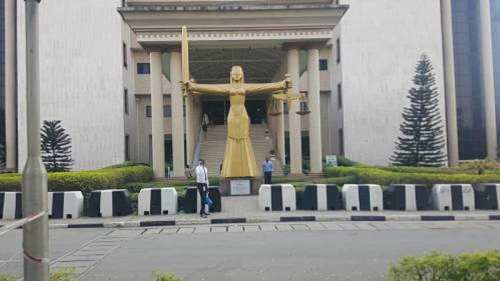Autonomy: 774 LGs challenge FG, states in court Tuesday

The Federal High Court sitting in Abuja will on Tuesday hear a suit filed by the Association of Local Governments of Nigeria against the Central Bank of Nigeria and others over the implementation of local government autonomy.
The suit, marked FHC/ABJ/CS/353/2025, was instituted by the Registered Trustees of ALGON against the Attorney General of the Federation, the Minister of Finance, state Commissioners for Finance, and 21 others.
Other defendants include the Minister of Budget and National Planning; Accountant-General of the Federation; the Revenue Mobilisation, Allocation and Fiscal Commission; the Nigerian National Petroleum Company Limited, various commercial banks, and one Bello Lawal.
Following the Supreme Court judgment of July 11, 2024, which granted financial autonomy to LGs, ALGON filed a suit seeking an order restraining the disbursement of funds to local governments without its approval.
Additionally, ALGON demands that the 774 local councils be granted representation at Federation Account Allocation Committee meetings where allocations are discussed.
ALGON Secretary-General, Mohammed Abubakar, confirmed the suit hearing date to The PUNCH on Sunday.
In its originating summons, ALGON trustees’ prayers include: “A declaration that, given the Supreme Court decision on 11th July 2024, in Suit No: SC/CV/343/2024, between Attorney-General of Federation vs Attorney-General, Abia State and 35 Ors, Constitution of ALGON, 1999, the 1st to 8th defendants cannot disburse monies to the 774 local government councils in Nigeria, through the 9th to 23rd defendants or any other person whatsoever, without the plaintiff authorising, approving said 9th to 23rd defendants or any other person whatsoever after conducting due diligence on them to avert any diversion of the funds of the local government councils.
“A declaration that, given the Supreme Court decision on July 11, 2024, the 1st to 7th defendants or any other person whatsoever cannot discuss, approve, disburse or in any other way whatsoever deal with the monies accruing to the 774 local government councils in Nigeria without the representation of the local government councils at such deliberations, discussions, committees, howsoever called, including at the Federation Account Allocation Committee chaired by the 2nd defendant.”
Furthermore, ALGON contends that, while the Supreme Court judgment intends to liberate the local government administration, the AGF, Ministry of Finance, state Commissioners of Finance and CBN have taken “precipitate action to frustrate the implementation of the decision.”
ALGON, through its counsel, Okechukwu Uju-Azorji, further claimed that the 9th to 23rd defendants, which are the commercial banks, are already taking steps “to be the conduit pipe or warehouse from which any money or allocation meant for the local government councils will be collected.”
Meanwhile, nearly all defendants have filed preliminary objections, challenging ALGON’s locus standi to initiate the suit.
The CBN, represented by Sam Ologunorisa (SAN), submitted a notice of preliminary objection dated March 24, 2025, urging the court to dismiss the suit for lack of jurisdiction.
The apex bank contends that ALGON is not a legal entity recognised by the Constitution or any statute, and was not a party or beneficiary in the Supreme Court case upon which it now relies.
“The plaintiff/respondent was not a party to or named as a beneficiary of the Supreme Court decision in Attorney General of the Federation vs Attorney General of Abia State and Ors. SC/CV/343/2024 was delivered on 11th July 2024, upon which the plaintiff/respondent purports to rely for this suit.
“The plaintiff/respondent is neither a statutory body nor a government agency but rather an incorporated trustee (a non-governmental organisation) not listed in the Constitution or any statute.”
It further stated, “In precis, the plaintiff/respondent has no cause of action and locus standi to competently call on this honourable court to determine the questions brought before it and to grant the consequential reliefs sought. Also, this honourable court lacks the jurisdiction to hear and determine this suit as it is a clear abuse of the court process and urges this honourable court to be wary of the ploy of the plaintiff/respondent in inviting this honourable court to dispense its valuable time and resources on academic issues and usurp the powers of the legislative arm of government.”
The CBN maintained that under the Central Bank of Nigeria Act, 2007, only statutory bodies may interface with the CBN in banking matters, and ALGON does not fall into this category.
It argued that ALGON’s assertion—that its approval is required before commercial banks can act as bankers to local councils—is unfounded and unsupported by law.
The apex bank urged the court to dismiss the case with substantial costs awarded against the plaintiff.
Similarly, counsel for the Federal Account Allocation Committee, Olawale Fapohunda (SAN), argued that ALGON lacks the legal standing to bring the case, thereby robbing the court of jurisdiction.
“That being the case, since on the face of the plaintiff’s claim with requisite locus standi, we submit that it has also disrobed or divested this court of jurisdiction.
“We submit that by the tenor of the plaintiff’s claim before this court, it is obvious that the plaintiff is a mere busybody who has no statutory standing in the business of revenue sharing in Nigeria,” Fapohunda argued.
Also, the state Commissioners of Finance, through their counsel, Olawale Fapohunda (SAN), stipulated the members of FAAC as not include representatives of the 774 LGAs, as being canvassed for.
He cited Section 6(1) of the Allocation of Revenue (Federation Account, etc.) Act, 1982, which outlines the FAAC’s statutory membership—excluding local government representation.
“The plaintiff is not recognised under the Constitution and cannot enforce rights that were never conferred upon it by the law,” he added.
Also speaking on behalf of the state Commissioners for Finance, Fapohunda argued that ALGON is not a member of FAAC and lacks any constitutional or statutory entitlement to participate in its processes.
In an affidavit, Jeff Otache, the administrative manager at the offices of the Incorporated Trustees of State Finance Commissioners, described ALGON’s suit as “vague, imprecise, evasive, and an abuse of court process.”
The commissioners held, “The suit of the plaintiff is conjectural, vague, imprecise, evasive and hollow. That hearing the suit is a sheer waste of judicial time and it is in the interest of justice to dismiss or strike out the suit for want of jurisdiction.
“I know as a fact that the plaintiff is not a member of any of the defendants and as such cannot force itself on them. I also know for a fact that the plaintiff is a non-government organisation that has no nexus with the defendants’ statutory duties. That the plaintiff/respondent is not entitled to any of the reliefs sought,” he stated.
In response, however, ALGON filed a counter-affidavit, asserting its legal status.
It claims to have been incorporated as an association on May 10, 2002, with the principal objective of promoting and defending the autonomy and interests of local governments in Nigeria.
ALGON further accused the 24th defendant of falsely parading himself as its President without valid authority, in violation of the group’s constitution.
The group submitted its constitution and Corporate Affairs Commission registration documents as evidence of its legal status and right to sue.





